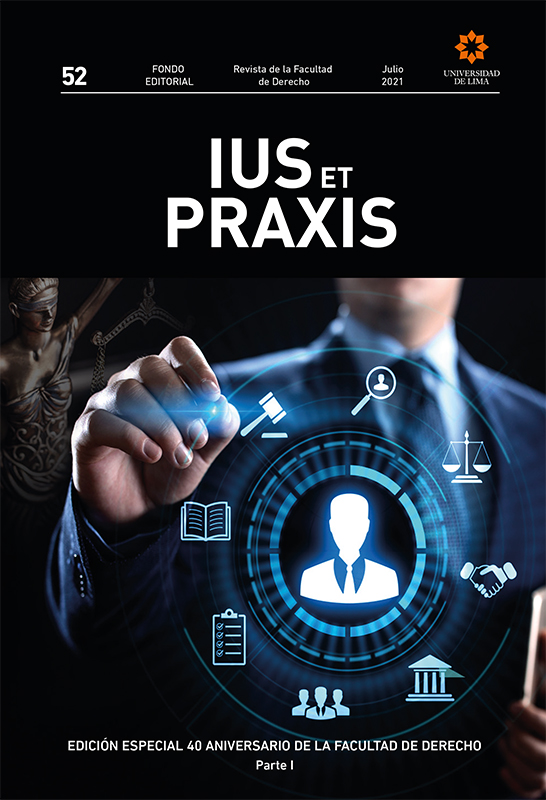Constitutional Justice as Legislation: Schmitt against Kelsen in the 21st Century
DOI:
https://doi.org/10.26439/iusetpraxis2021.n052.5067Keywords:
constitutional justice, politicization of justice, constitutional interpretation, constitutional control, weightingAbstract
Nowadays, the prominent role of constitutional interpretation in the practice of law is an obvious fact. This leads us to discuss the impact of such situation not only in terms of a correct administration of justice but also as for the huge expectations about the future of democracy that depends exactly on the proper application of law. In the last century, a renowned German jurist, Carl Schmitt (1888-1985), considered that the emergence of constitutional justice in Europe could only lead to the politicization of justice and that the law would have nothing to gain from this but, on the contrary, much to lose. However, what in the last century was a lukewarm start turned into a dominant reality after World War II. Constitutional justice has been displacing ordinary justice and, as a result, the prediction of Professor Schmitt could be fulfilled. In this sense, Schmitt’s critical arguments against this trend of constitutionalization of law will be taken up again, emphasizing the weaknesses of the so-called constitutional justice and its fatal conversion into legislation.
Downloads
References
Alexy, R. (2002). Epílogo a la Teoría de los derechos fundamentales. Revista Española de Derecho Constitucional, 22(66), 13-64.
Bobbio, N. (1999). Teoría general del derecho. Madrid: Debate.
Comanducci, P. (2007). Modelos e interpretación de la Constitución. En M. Carbonell Sánchez (Coord.), Teoría del constitucionalismo: ensayos escogidos (pp. 41-70). Madrid: Trotta.
Croce, M., y Goldoni, M. (2020). The legacy of pluralism. The continental jurisprudence of Santi Romano, Carl Schmitt and Constantino Mortati. Stanford, CA: Stanford University Press.
De Miguel, J., y Tajadura, J. (2018). Kelsen versus Schmitt. Política y derecho en la crisis del constitucionalismo. Madrid: Escolar y Mayo.
Forsthoff, E. (2013). El Estado de la sociedad industrial. Madrid: Fundación Coloquio Europeo; Centro de Estudios Políticos y Constitucionales.
Herrera, H. (2020). Carl Schmitt between technological rationality and theology. Nueva York: SUNY Press.
Herrero, M. (2014). La respuesta de Carl Schmitt al problema de la decisión judicial. En J. Peña González (Coord.), Carl Schmitt y el decisionismo jurídico (pp. 27-39). Madrid: Fundación Universitaria San Pablo CEU.
Kelsen, H. (1994). La garantía jurisdiccional de la Constitución. La justicia constitucional. Ius et Veritas, 5(9), 17-43.
Kelsen, H. (1995). ¿Quién debe ser el defensor de la Constitución? Madrid: Tecnos.
Kelsen, H. (2014). Teoría general del derecho y del Estado. Ciudad de México: Universidad Nacional Autónoma de México.
Peña González, J. (Coord.). (2019). Carl Schmitt y el decisionismo jurídico. Madrid: Fundación Universitaria San Pablo CEU.
Pozzolo, S. (2011). Neoconstitucionalismo y positivismo jurídico. Lima: Palestra Editores.
Schmitt, C. (1996). Sobre los tres modos de pensar la ciencia jurídica. Madrid: Tecnos.
Schmitt, C. (1998). La defensa de la Constitución. Madrid: Tecnos.
Schmitt, C. (2005). El concepto de lo político. Madrid: Alianza.
Schmitt, C. (2011). Teoría de la Constitución. Madrid: Alianza.
Schmitt, C. (2012). Posiciones ante el derecho. Madrid: Tecnos.
Schmitt, C., y Kelsen, H. (2018). La polémica Schmitt/Kelsen sobre la justicia constitucional: El defensor de la Constitución versus ¿Quién debe ser el defensor de la Constitución? Madrid: Tecnos.
Vázquez, R. (2012). Consenso socialdemócrata y constitucionalismo. Ciudad de México: ITAM; Fontamara.



